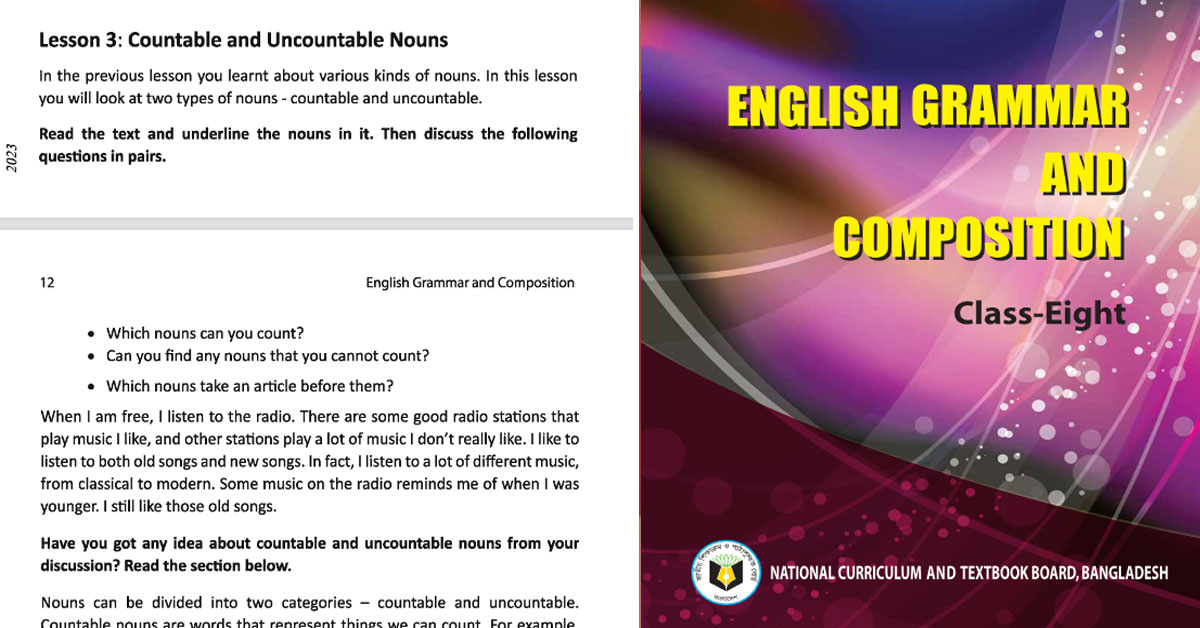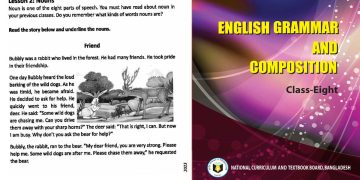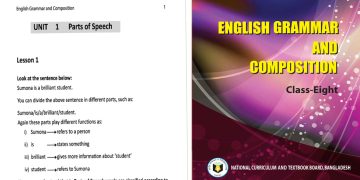In the previous lesson you learnt about various kinds of nouns. In this lesson you will look at two types of nouns – countable and uncountable. Read the text and underline the nouns in it. Then discuss the following questions in pairs.
- Which nouns can you count?
- Can you find any nouns that you cannot count?
- Which nouns take an article before them?
When I am free, I listen to the radio. There are some good radio stations that play music I like, and other stations play a lot of music I don’t really like. I like to listen to both old songs and new songs. In fact, I listen to a lot of different music, from classical to modern. Some music on the radio reminds me of when I was younger. I still like those old songs.
Have you got any idea about countable and uncountable nouns from your discussion? Read the section below.
Countable and Uncountable.
Nouns can be divided into two categories Countable nouns are words that represent things we can count. For example, the word song is a countable noun. Here are some more examples:
- An old song, two new songs, etc.
- A collection of 100 songs
Uncountable nouns are words that represent things we do not count. For example, the word music is an uncountable noun. Here are some examples:
- a lot of music
- the music of the 70s
Now, let’s look at countable and uncountable nouns in more details.
Countable nouns: Countable nouns are either singular or plural. They can be counted and expressed in numbers.
I need to buy four new suitcases. – Suitcase (s) is a countable noun as adding ‘s’ to it makes it plural.
I want five oranges? – Here five is used to count the number of oranges.
Countable nouns are easy to recognise. They are things that we can count. For example: ‘pen’. We can count pens. We can have one, two, three or more pens. Most countable nouns become plural by adding an ‘s’ at the end of the word. We can use the indefinite article a/an with countable nouns:
• a good book
When a countable noun is singular, we must use a word like a/the/my/this with it:
- I want an orange. (not I want orange.)
- Where is my watch? (not Where is watch?)
We can use some and any with countable nouns:
- I’ve got some coins.
- Have you got any pens?
We can use a few and many with countable nouns:
- I’ve got a few coins.
- I haven’t got many pens.
Read the sections below to check your ideas.Formation of plural of regular nouns. Most nouns form the plural by adding -s.
- Singular: house, cat, river, boat.
- Plural: houses, cats, rivers, boats
- A noun ending in s, x, ch, sh makes the plural by adding – es
- Singular: bus, wish, pitch, box
- Plural: buses, wishes, pitches, boxes.
- A noun ending in a consonant and then y, makes the plural by dropping the y and adding -ies
- Singular: spy, baby, city, daisy.
- Plural: spies, babies, cities, daisies.
Formation of plural of irregular nouns: There are some irregular formations of plural nouns. Some of the most common ones are listed below:
- Singular: woman, man, child, tooth, foot, person, leaf, mouse, goose, half, knife, wife, elf, loaf, potato.
- Plural: halves, knives, women, men, children, teeth, feet, persons, leaves, mice, geese, wives
life, lives, elves, loaves.
List of some Uncountable Nouns:
General: homework, equipment, luggage, clothing, furniture, machinery, gold, silver, cotton, glass
jewelry.
Abstract: advice, help, fun, recreation, enjoyment, information, knowledge, news, patience, happiness, progress.
Using Countable & Uncountable Nouns: Look at the following list and notice which words are used with countable and uncountable nouns:
Words used with countable nouns only-
A: a doctor, a pen, a meal, a class, a college
Many: many cups, many books, many libraries, many flights
Words used with countable nouns only:
Few: few questions, few tables, few apples, few holidays, few countries.
A few: a few questions, a few problems, a few issues
Words used with uncountable nouns only:
Much: much money, much time, much food, much water, much energy.
Little: little trouble, little equipment, little meat, little patience.
A little bit of: a little bit of confidence, a little bit of sleep, a little bit of rain.
Words used with both countable & uncountable nouns
- Some-countable: some tables, some stores, some grapes, some cities, some nurses.
- Some-uncountable: some time, some news, some bread, some salt.
Any-countable: any socks, any bathrooms, any ideas, any beliefs.
Any-uncountable: any advice, any soap, any transportation, any gold, any homework.
- No countable: no magazines, no chocolates, no pilots, no rings, no markers.
- No uncountable: no trouble, no grass, no scenery, no money, no furniture.
A lot of countable: a lot of animals, a lot of coins, a lot of people, a lot of babies.
A lot of uncountable: a lot of help, a lot of happiness, a lot of fun.
- Lots of countable: lots of computers, lots of buses, lots of colleges.
- Lots of uncountable: lots of cake, lots of ice cream, lots of energy, lots of laughter.
Enough countable: enough plates, enough onions, enough restaurants.
Enough uncountable: enough courage, enough wisdom, enough rice, enough time.
- Plenty of countable: plenty of houses, plenty of books.
- Plenty of uncountable: plenty of oil, plenty of sugar.











